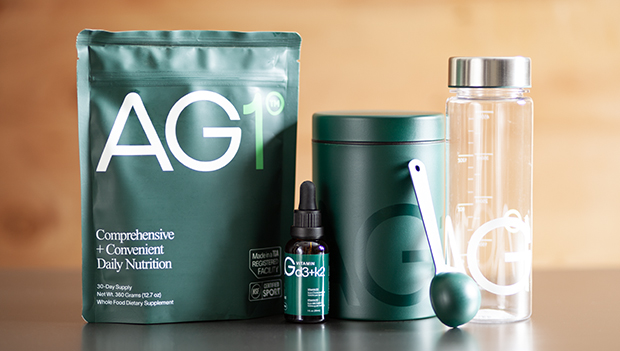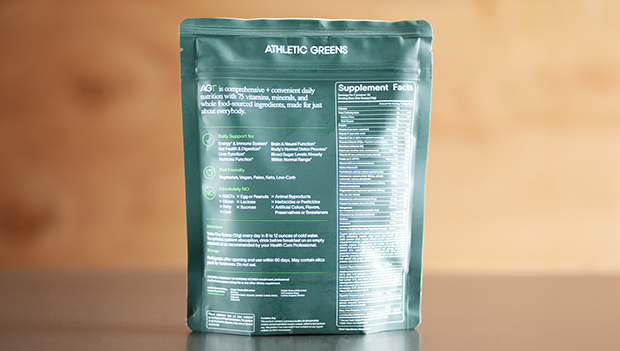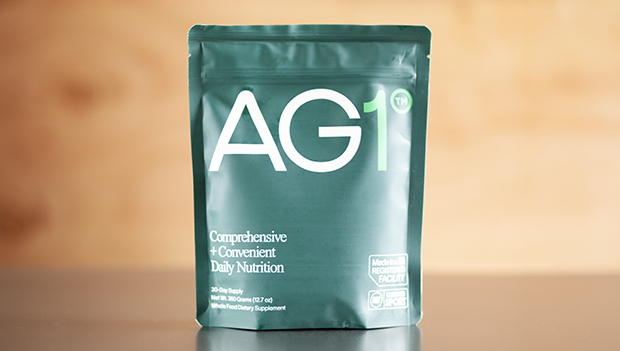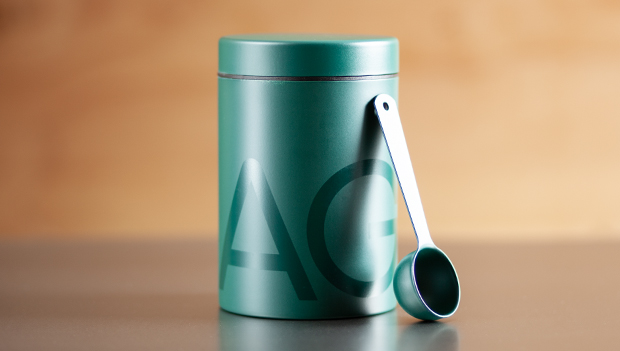
By clicking on the product links in this article, we may receive a commission fee at no cost to you, the reader. Sponsorships and affiliate commissions help support our research so we can help you find the best products. Read our full affiliate disclosure here.
In today's fast-paced world, it's not always easy to eat as well as we should, especially when it comes to fresh fruits and vegetables. According to a 2015 Centers for Disease Control study, only 1 out of every 10 adults consumes the recommended daily intake of fruits and vegetables.
Fruits and vegetables provide essential nutrients for wellness, antioxidants that help stave off disease, prebiotics that improve digestion, and many other benefits. In our grab-and-go world of nutrition bars and shakes, adding a greens powder to your routine may be one of the easiest ways to increase your consumption of these disease-fighting, powerhouse foods.
Athletic Greens, an independently produced product out of New Zealand, has recently risen in popularity due to social media marketing. It made our list of the Best Greens Powders of 2022, taking the title of "Best Overall." In this Athletic Greens Review, we'll dive further into the reason for that ranking, providing background on the company, their flagship AG1 product, and the functionality of the AG1 ingredient list to help you decide if Athletic Greens is right for your health needs.
A Quick Look at Athletic Greens
Athletic Greens was created by New Zealander Chris "Kiwi" Ashenden in 2009 to provide foundational nutrition in an easy-to-take daily powder. Athletic Greens' flagship product, AG1, is not a meal replacement powder, rather it is a whole food greens and superfoods powder that provides a wide array of vitamins, minerals, functional herbs, mushrooms, digestive enzymes, probiotics, and prebiotics. It is intended to supplement the diet, filling in nutritional gaps and providing nutrient-dense superfoods in a highly accessible (i.e., just-add-water) powder.
AG1 is a comprehensive blend of functional ingredients that, in addition to providing a balanced blend of vitamins and minerals, also contains ingredients to boost immunity, improve digestion and nutrient absorption, improve stress adaptation, support your microbiome, and more. According to the product website, AG1 contains over 75 vitamins, minerals, and whole-food nutrients and may replace other daily vitamin supplements.
Athletic Greens thrives on the idea that good nutrition is a fundamental right for everyone. To that end, they've partnered with several organizations worldwide that provide meals to people in need, such as No Kid Hungry and Mary's Meals. In addition, Athletic Greens is committed to sustainable growth and achieved Climate Neutral Certification in 2020. If company ethics resonate with you, Athletic Greens is certainly taking strides.
Athletic Greens Ingredients

The incredibly long list of functional vitamins, minerals, and whole-food nutrients aims to be the one-stop-shop for all micronutrients you may need on a daily basis. They are divided into five different categories, based on their properties:
- Vitamins and minerals: The adequate balance of vitamins and minerals helps improve your immune system and promotes the optimal functioning of your nervous system.
- Superfood complex: These powerhouse ingredients help improve your gut microbiome, promote digestive health, and reduce inflammation.
- Dairy-free probiotics: Replenish your gut flora with beneficial bacteria, enhance nutrient absorption, and help strengthen your immune system.
- Plant extracts and antioxidants: Help fight off free radicals and their oxidative damage, protecting against diseases and reducing inflammation.
- Enzyme and mushroom complex: Improve your digestive process, enhance nutrient absorption, improve bowel function, and strengthen your immune system.
The entire formula is vegan, low-carb, and gluten-free, and it’s also free from artificial ingredients, genetically modified organisms (GMOs), sweeteners, and major allergens. The only potential allergen comes from soy as soy lecithin, but it contains no soy trypsin inhibitor or other soy proteins that would be harmful to one’s health.
Benefits of Athletic Greens
This powerful greens supplement has a plethora of health benefits in its toolkit as it aims to be the only daily supplement you’ll need to completely satisfy all of your nutrient needs.
The large variety of letter vitamins, minerals, and essential fatty acids (such as alpha lipoic acid) help improve your immune system and support cardiovascular health, the probiotics help balance out your gut flora and improve your overall gut health, the adaptogens help your body adapt to stress, the antioxidants fight free radicals and inflammation, the medicinal mushrooms strengthen your immune system, and the digestive enzymes help improve your digestion of food as well as enhance overall nutrient absorption.
Specific vitamins and minerals play a huge role in different areas of your body, from building your hair and nails and improving collagen production in your skin to balancing out your hormones and promoting bone health.
How To Use Athletic Greens
Athletic Greens are easy to take and even easier to drink. Only one scoop contains all the 75 functional ingredients your body needs to thrive and it’s easy to blend into 8 to 10 ounces of water, juice, or any other beverage of your choice.
It’s best when taken early in the morning on an empty stomach to maximize absorption, but it can be taken any time of day and ideally 10 minutes before a meal. Considering how powerful and potent it is, the recommended daily dose should not be exceeded.
Who Should Buy Athletic Greens?
Despite the name, Athletic Greens is not exclusively for athletes. Rather, it is a product that can improve the nutrition of anyone looking to optimize their health and power through the demands of modern life.
Even if you are the 1 of 10 people who consumes the recommended daily value of fruits and vegetables, you may still be lacking in essential vitamins and minerals. Due to the declining quality of most modern food sources, it has become exceedingly difficult to get all the nutrition your body needs exclusively from food.
BUY ATHLETIC GREENSFor example, modern farming practices have depleted nutrients from our soil, leaving our crops far less nutrient-dense than they once were. While regenerative and sustainable farms are working to reverse this, most of the United States' crop foods come from depleted soils.
This is where AG1, like a good multivitamin, can fill in—but unlike a basic multivitamin, AG1 also provides a plethora of nutrition beyond the standard vitamin.
This powder is a great option for anyone wanting to ensure their daily nutritional needs are met and for anyone looking to boost their overall health and wellness. According to the product website, AG1 is "safe for adults of all ages and lifestyles, including athletes and those following specialty diets."
AG1 recently gained the NSF Certified for Sport certification. NSF is a global certification program and is the only independent, third-party certification program recognized by the United States Anti-Doping Agency and many professional sports leagues like the MLB and NHL. This certification verifies supplement purity and safety regarding over 270 banned substances, making AG1 suitable for athletes at any level.
Athletic Greens: What's Inside
SPECS
- Ingredients: Vitamins and minerals; alkaline, nutrient-dense raw superfood complex; nutrient-dense extracts, herbs, and antioxidants; digestive enzyme and super mushroom complex; dairy-free probiotics 7.2 billion CFU; natural flavors
- Dosage: One 12g scoop
- Form: Powder
- Price: $$$
What We Like
- The superfood complex in Athletic Greens AG1 is raw, which means all of the naturally-occurring enzymes and vitamins in these plant foods stay intact and active.
- AG1 is loaded with whole-food superfoods and herbs that can truly boost your health beyond the most basic greens powders. A few of our favorites include:
- Artichoke powder for antioxidants and inulin to improve gut health and cholesterol levels.
- Ashwagandha root extract to balance hormones and the stress response.
- Dandelion to support liver detoxification and blood sugar regulation.
- Coenzyme Q-10 to support cardiovascular health.
- Rhodiola to fight anxiety and fatigue.
- Includes digestive enzymes to aid digestion and absorption of nutrients, plus prebiotics and probiotics to improve gut health.
- Mostly allergen friendly (no gluten, dairy, corn, eggs, tree nuts, peanuts, fish, or crustaceans) and suitable for most specialty diets.
- Clean product that's free from GMOs, herbicides, pesticides, and artificial colors, flavors, sweeteners, and preservatives.
What We Don't Like
- Some of the added vitamins do not come from whole-food sources (e.g., added vitamin C is from ascorbic acid, which is not as bioavailable as true vitamin C).
- There is no fat included in the product. Unless dietary fat is consumed with the powder, the body cannot absorb the fat-soluble vitamins A, D, E, and K.
- This is a very pricey product per serving.
Why Trust Us?
The health and safety of ACTIVE's readers are of the utmost importance to us. To ensure your well-being when consuming nutritional supplements, the ACTIVE.com editorial team prioritizes products that are independently tested by a third party. We've also consulted with a team of nutritionists and dieticians to ensure the products we feature are of the highest standard. This helps us create the most accurate, authentic review content for our readers.
FAQs About Athletic Greens
Which athletes use Athletic Greens?
According to the company website, Athletic Greens is used by a small handful of professional athletes, including:
- Angela Naeth - Red Bull athlete, pro triathlete, multiple Ironman/70.3 champion, @iracelikeagirl founder
- Patrick Frost - Nike Master Trainer, FrostFit owner and trainer, fitness model
- Tina Muir - Professional long-distance runner and host of Running for Real podcast
The Athletic Greens Instagram page is also frequented by Shawn Johnson, former Olympic gymnast and 2008 gold medalist. Athletic Greens sponsors and partners with a host of other pro triathletes such as Laura Philipp and Josh Amberger, skiers such as Karoline Pichler, and other fitness professionals and fitness junkies across social media platforms.
Does Athletic Greens help with gut health?
Athletic Greens contains both probiotics and prebiotics. Together, these ingredients can bolster gut health by supporting the gut microbiome. Maintaining a healthy gut microbiome is one of the single most important factors in digestive health and overall health.
The probiotic strains in AG1, Bifidobacterium bifidum and Lactobacillus acidophilus, have been shown to improve symptoms related to irritable bowel syndrome (IBS) and acute, chronic, and antibiotic-associated diarrhea. These probiotics have other proven benefits, such as helping to protect the gut against certain pathogens.
Prebiotics are found in Athletic Greens in the form of inulin and naturally occur in the whole-foods blend. These function as food for our good gut bacteria—prebiotics are the main energy source for our gut microbiome, making them pivotal to gut health. The International Scientific Association recommends that a healthy adult consume between 3 to 5 grams per day of the type of prebiotics found in AG1. Athletic Greens does not list the quantity of added or naturally-occurring prebiotics on their label, however, making it difficult to quantify this benefit.
AG1 also contains bromelain as an added digestive enzyme, as well as naturally-occurring digestive enzymes and digestive aids in the whole-foods blend. Collectively, these ingredients support digestive health and aid in nutrient absorption.
Does Athletic Greens help inflammation?
Athletic Greens does not directly target inflammation as one of its health objectives. That being said, the formula does contain plenty of anti-inflammatory ingredients. In particular, the ingredient list is heavy in antioxidant-rich foods, which combat inflammation.
Inflammation occurs in the body due to injury, infection, certain autoimmune conditions, and a diet heavy in oxidative compounds. Inflammation can be acute or chronic, and chronic inflammation is a major contributing factor to disease. Antioxidants work by preventing and correcting oxidative cell damage, which is one cause of chronic inflammation.
Dark leafy greens, such as spinach, and algae greens, such as spirulina and chlorella, are high in antioxidants and vitamin E, which is a powerful antioxidant. Green tea extract and cocoa bean polyphenol extract are also high in antioxidants, especially a class of polyphenols called catechins, which have shown to be effective in preventing oxidative stress by contributing to the body's antioxidant defense system. Therapeutic mushrooms are another source of antioxidant-rich compounds.
In addition to the list of antioxidant-rich ingredients, it is also worth noting that poor gut health is a significant contributing factor to chronic inflammation. Because AG1 supports gut health, it does have the potential to reduce chronic inflammation in the body.
Does Athletic Greens have caffeine?
Athletic Greens does not show any caffeine content on its labeling. The mix does contain green tea extract and cocoa, both of which contain caffeine. However, the amount of caffeine these two products contribute is likely negligible.
These statements have not been evaluated by the Food and Drug Administration. This product is not intended to diagnose, treat, cure, or prevent any disease.
References
- Lee-Kwan, S. H., Moore, L. V., Blanck, H. M., Harris, D. M., & Galuska, D. (2017). Disparities in state-specific adult fruit and vegetable consumption—United States, 2015. Morbidity and Mortality Weekly Report, 66(45), 1241.
- Gombart, A. F., Pierre, A., & Maggini, S. (2020). A review of micronutrients and the immune system–working in harmony to reduce the risk of infection. Nutrients, 12(1), 236.
- Zhang, P. (2022). Influence of Foods and Nutrition on the Gut Microbiome and Implications for Intestinal Health. International Journal of Molecular Sciences, 23(17), 9588.
- Khalesi, S., Bellissimo, N., Vandelanotte, C., Williams, S., Stanley, D., & Irwin, C. (2019). A review of probiotic supplementation in healthy adults: helpful or hype?. European journal of clinical nutrition, 73(1), 24-37.
- Ali, S. S., Ahsan, H., Zia, M. K., Siddiqui, T., & Khan, F. H. (2020). Understanding oxidants and antioxidants: Classical team with new players. Journal of food biochemistry, 44(3), e13145.
- Roxas, M. (2008). The role of enzyme supplementation in digestive disorders. Alternative medicine review, 13(4).
- Xiao, C. W., Wood, C., Cunningham, L. A., Lalande, M., & Riding, M. (2021). Effects of dietary active soybean trypsin inhibitors on pancreatic weights, histology and expression of STAT3 and receptors for androgen and estrogen in different tissues of rats. Molecular Biology Reports, 48(5), 4591-4600.
- Skibska, B., & Goraca, A. (2015). The protective effect of lipoic acid on selected cardiovascular diseases caused by age-related oxidative stress. Oxidative Medicine and Cellular Longevity, 2015.
- Liao, L. Y., He, Y. F., Li, L., Meng, H., Dong, Y. M., Yi, F., & Xiao, P. G. (2018). A preliminary review of studies on adaptogens: comparison of their bioactivity in TCM with that of ginseng-like herbs used worldwide. Chinese medicine, 13(1), 1-12.
- Choi, F. D., Sung, C. T., Juhasz, M. L., & Mesinkovsk, N. A. (2019). Oral collagen supplementation: a systematic review of dermatological applications. Journal of drugs in dermatology: JDD, 18(1), 9-16.
- Zhu, K., & Prince, R. L. (2012). Calcium and bone. Clinical biochemistry, 45(12), 936-942.
- Silver, W. L., Perez, T., Mayer, A., & Jones, A. R. (2021). The role of soil in the contribution of food and feed. Philosophical Transactions of the Royal Society B, 376(1834), 20200181.
- Moradi, M., Sohrabi, G., Golbidi, M., Yarmohammadi, S., Hemati, N., Campbell, M. S., ... & Farzaei, M. H. (2021). Effects of artichoke on blood pressure: A systematic review and meta-analysis. Complementary Therapies in Medicine, 57, 102668.
- Pfingstgraf, I. O., Taulescu, M., Pop, R. M., Orăsan, R., Vlase, L., Uifalean, A., ... & Pârvu, A. E. (2021). Protective effects of taraxacum officinale L.(dandelion) root extract in experimental acute on chronic liver failure. Antioxidants, 10(4), 504.
- Sarmiento, A., Diaz-Castro, J., Pulido-Moran, M., Kajarabille, N., Guisado, R., & J Ochoa, J. (2016). Coenzyme Q10 supplementation and exercise in healthy humans: A systematic review. Current Drug Metabolism, 17(4), 345-358.
- Li, Y., Pham, V., Bui, M., Song, L., Wu, C., Walia, A., ... & Zi, X. (2017). Rhodiola rosea L.: an herb with anti-stress, anti-aging, and immunostimulating properties for cancer chemoprevention. Current pharmacology reports, 3(6), 384-395.
- Dinan, T. G., & Cryan, J. F. (2017). The microbiome-gut-brain axis in health and disease. Gastroenterology Clinics, 46(1), 77-89.
- Guglielmetti, S., Mora, D., Gschwender, M., & Popp, K. (2011). Randomised clinical trial: Bifidobacterium bifidum MIMBb75 significantly alleviates irritable bowel syndrome and improves quality of life––a double‐blind, placebo‐controlled study. Alimentary pharmacology & therapeutics, 33(10), 1123-1132.
- María Remes-Troche, J., Coss-Adame, E., Ángel Valdovinos-Díaz, M., Gómez-Escudero, O., Eugenia Icaza-Chávez, M., Antonio Chávez-Barrera, J., ... & Solana Ortiz, R. (2020). Lactobacillus acidophilus LB: a useful pharmabiotic for the treatment of digestive disorders. Therapeutic advances in gastroenterology, 13, 1756284820971201.
- Chacko, S. M., Thambi, P. T., Kuttan, R., & Nishigaki, I. (2010). Beneficial effects of green tea: a literature review. Chinese medicine, 5(1), 1-9.
- Muszyńska, B., Grzywacz-Kisielewska, A., Kała, K., & Gdula-Argasińska, J. (2018). Anti-inflammatory properties of edible mushrooms: A review. Food Chemistry, 243, 373-381.
- Al Bander, Z., Nitert, M. D., Mousa, A., & Naderpoor, N. (2020). The gut microbiota and inflammation: an overview. International journal of environmental research and public health, 17(20), 7618.




